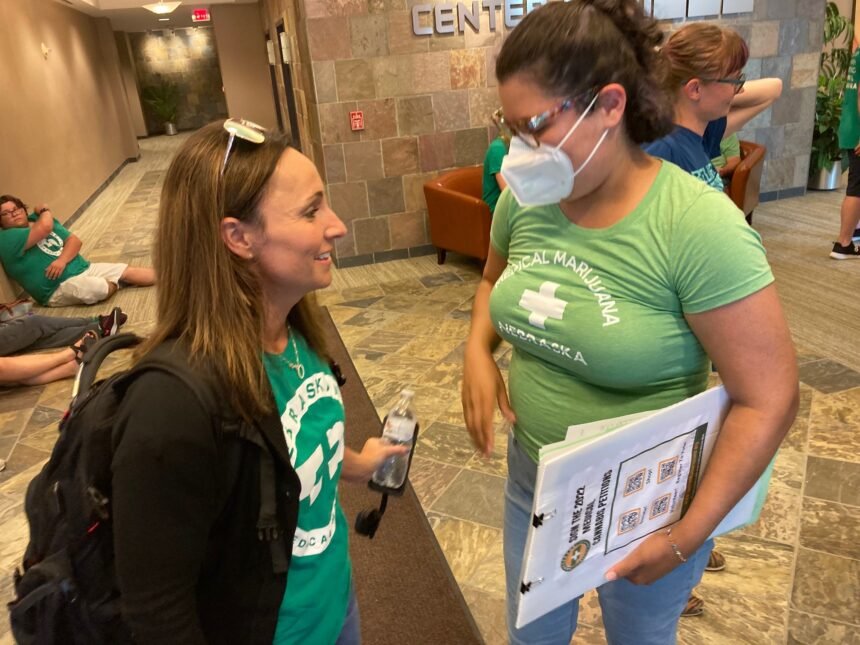Nebraskan Crista Eggers is running up against a July 3 deadline. If she can get at least 87,000 names onto each of two petitions before then, she can put an initiative on the state’s November ballot that would legalize pot for medicinal purposes.
The petition effort is personal. Her 9-year-old son, Colton, has epilepsy and severe seizures, and medicinal cannabis can be prescribed to treat such conditions.
“I’m a caregiver to a child that needs medical cannabis access. Ninety-five percent of our people collecting [signatures] are Nebraskans who know someone who needs access and needs this issue on the ballot,” said Eggers, an Omaha resident and the campaign manager for Nebraskans for Medical Marijuana.
If the group is successful, Nebraska will join Florida and South Dakota in asking voters this fall whether to legalize some marijuana use. In Florida and South Dakota, where medical marijuana is already allowed, voters will be asked to legalize adult recreational use.
Thirty-eight states and the District of Columbia allow the medical use of cannabis products, and 24 plus the District of Columbia allow adults to use it recreationally, according to the National Conference of State Legislatures. Cannabis is still illegal under federal law, but 74% of Americans now live in a state where marijuana is legal for either recreational or medical use according to the Pew Research Center, and 54% live in a place where it is legal for recreational use.
Many states, especially left-leaning ones, have legalized marijuana through legislation, but “there are some states where the state legislators still don’t want to touch this issue of cannabis legislation, particularly in more conservative parts of the country,” said Beau Kilmer, co-director of the RAND Drug Policy Research Center.
“That’s why it’s not a surprise when cannabis issues go through the ballot initiative process,” Kilmer said.
As more states legalize pot, their uneven safety rules can pose a risk
In Kansas, where legislative efforts to legalize marijuana have repeatedly foundered since 2021, conservative legislators again this session blocked a measure to legalize medicinal use, with one Republican lawmaker, state Sen. Mike Thompson, saying the substance could “cause more suicides and human misery,” according to the Kansas City Star.
Kansas is one of the 24 states that don’t allow citizen-initiated ballot measures.
But the destigmatizing of marijuana use has advanced so far that even some conservative states have legalized it through legislative action: Since 2020, four of the five states to legalize cannabis for medicinal purposes — Alabama, Kentucky, Mississippi and Virginia — have done so through the legislature.
Making it to the ballot
Nebraska is one of only three states — Idaho and Kansas are the others — where marijuana and all cannabis products, including CBD products, are illegal.
Nebraska legislators have shown little interest in changing course, Eggers said.
To circumvent that legislative opposition, she needs signatures from 7% of the state’s 1.2 million voters to put the question on the ballot. She also needs signatures from 5% of registered voters from at least 38 of Nebraska’s 93 counties. Along with Eggers, some 25 paid staff and 200 volunteers are helping with the effort.
Eggers and her group came close to getting a cannabis measure on the ballot in 2020, after collecting 200,000 signatures. However, the state’s Supreme Court invalidated the measure, saying that the petition violated the state’s single-subject rule for ballot initiatives.
Nebraska medical marijuana advocates surpass one of two key signature hurdles
The Supreme Court ruled that the petition would have required changes in several state laws, including those regarding possession, public use and insurance coverage.
A second attempt in 2022 was gathering steam when a major donor died in a plane crash that year.
“A lot of money goes into collecting signatures, from filling up people’s gas so they can go county to county, printing petitions and the amount of manpower that goes into gathering signatures,” Eggers said. “The issue isn’t support. We have the support. It has truly come down to not having funding to hire people to help towards signature collection.”
Recreational cannabis
Last year, three states legalized pot recreationally. Voters in Ohio, a red state, approved a ballot measure, while lawmakers in the blue states of Delaware and Minnesota passed legislation.
In all, 13 states plus the District of Columbia have legalized marijuana legislatively.
The ballot initiative in Florida, which requires a supermajority of 60% to pass, is being backed by John Morgan, a lawyer and Democratic fundraiser who supported the successful 2016 effort to legalize medical marijuana with more than $8 million of his own money.
Florida Republican Gov. Ron DeSantis opposes the measure. So do some in the state’s medical marijuana industry. Nick Garulay, CEO of My Florida Green, said he worries that legalizing recreational marijuana could bring more competition, and could make it “hard to separate those who want to use it recreationally from those who are sick and rely on cannabis for medication.”
Motley Marijuana Laws Drive Consumers — and Revenue — Across State Lines
Rob Mikos, a professor at Vanderbilt University Law School and an expert on drug law, agreed that in some cases, the passage of recreational cannabis can lead to a decline in medical cannabis patients.
But there isn’t enough data to definitively say how adult-use recreational cannabis has affected the medical market in the places that have legalized both medical and recreational cannabis, he said.
For Eggers, the month of June is crucial. As of June 10, she had about 65,000 signatures on each petition, about 30,000 short of the total she expects to need for each.
“We know this can get done, but there’s definitely an urgency over the next few weeks,” she said.
“I call our campaign horrifically beautiful,” Eggers said. “It’s horrific we’ve been at this for such a long time for suffering Nebraskans. But beautiful because we’ve found support in almost all corners of the state.”
GET THE MORNING HEADLINES DELIVERED TO YOUR INBOX










